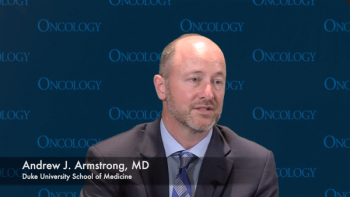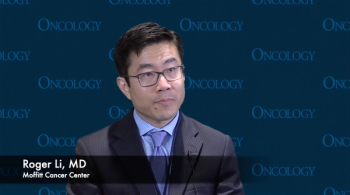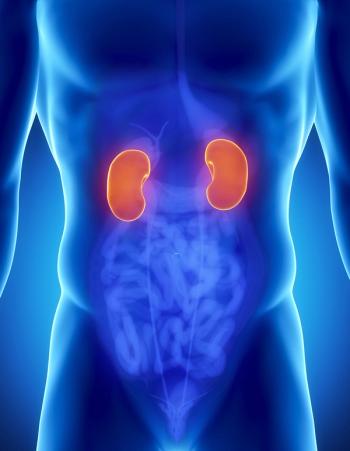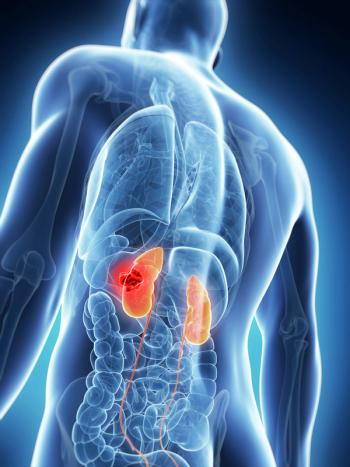
Data from a substudy of the phase 3 VISION trial presented at 2022 ASCO Annual Meeting showed that higher standard mean uptake value by PSMA-PET is strongly associated with outcomes for patients with metastatic castration-resistant prostate cancer.

Your AI-Trained Oncology Knowledge Connection!


Data from a substudy of the phase 3 VISION trial presented at 2022 ASCO Annual Meeting showed that higher standard mean uptake value by PSMA-PET is strongly associated with outcomes for patients with metastatic castration-resistant prostate cancer.

Ian D. Davis, MBBS, PhD, spoke about updated survival results of the ENZAMET trial which analyzed enzalutamide in metastatic hormone-sensitive prostate cancer.

Roger Li, MD, spoke about future trials planned for the combination of CG0070 plus pembrolizumab for patients with non–muscle invasive bladder cancer who were unresponsive to bacillus Calmette-Guerin.

Roger Li, MD, spoke about the safety profile of CG0070 plus pembrolizumab for patients with non–muscle invasive bladder cancer.

Roger Li, MD, spoke about responses from the CORE1 trial that examined patients with non–muscle invasive bladder cancer treated with CG0070 plus pembrolizumab.

Roger Li, MD, spoke about the mechanism of action of CG0070 used in combination with pembrolizumab to treat patients with non–muscle invasive bladder cancer who were unresponsive to bacillus Calmette-Guerin.

Richard Kim, MD, discussed key findings of the phase 1b KEYNOTE-651 trial, examining pembrolizumab plus standard chemotherapy in patients with microsatellite-stable or mismatch repair–proficient colorectal cancer.

Patients with very high-risk renal cell carcinoma experienced a notable relapse-free survival benefit vs placebo following treatment with everolimus.

The radiotherapy schedules used in the ATLAS trial reflect recent evidence and guideline changes for its usage in patients with high-risk localized or locally advanced prostate cancer.

Metastatic progression pattern with darolutamide appears to be unaltered in nonmetastatic castration-resistant prostate cancer, despite the agent resulting in better survival outcomes.

A post-hoc analysis of the phase 3 TITAN trial revealed potential biomarkers that may predict overall survival in patients with metastatic castration-resistant prostate cancer receiving apalutamide plus androgen deprivation therapy.

Unlike with enzalutamide, it appears darolutamide does not affect systemic exposure of cabazitaxel in patients with metastatic castration-resistant prostate cancer.

Data presented at 2022 ASCO reveals PET-imaging characteristics linked with 177Lu-PSMA-617 efficacy in metastatic castration-resistant prostate cancer.

Results of the ENZAMET trial presented at 2022 ASCO continue to support use of enzalutamide in patients with metastatic hormone-sensitive prostate cancer.

Similar overall survival, better patient-reported outcomes, and fewer adverse effects were observed when patients were treated with 177Lu-PSMA-617 vs cabazitaxel in metastatic castration-resistant prostate cancer.

Lenvatinib plus pembrolizumab decreased the risk of disease progression or death on second-line therapy by 50% compared with sunitinib in the phase 3 CLEAR trial.

A manageable safety profile and good clinical activity were observed with toripalimab in Chinese patients with urothelial carcinoma.

An exploratory analysis of the JAVELIN Bladder 100 study indicated long-term overall survival benefit for patients with advanced urothelial carcinoma who received avelumab maintenace, without regard for treatment given in the second-line setting.

Results of the phase 3 EVEREST trial show adjuvant everolimus improved recurrence-free survival for patients with very high-risk renal cell carcinoma.

Results from the phase 2 ATLANTIS trial did not show a benefit of cabozantinib in patients with advanced urothelial carcinoma compared with the placebo, but the treatment appeared to be tolerable.

Results of the COSMIC-021 trial presented at ASCO 2022 show promise of cabozantinib plus atezolizumab for urothelial carcinoma.

Judd Moul, MD, discusses the gravity of new data on systemic therapies for men with castration-resistant prostate cancer and how they can be of use during the COVID-19 pandemic.

Robert A. Figlin, MD, discusses the potential role of adjuvant immunotherapy for patients with bladder cancer.

CancerNetwork® sat down with Edmund Qiao at the 2021 American Society of Clinical Oncology Annual Meeting to talk about prostate-specific antigen screening and prostate cancer prevention in African American men.

Robert A. Figlin, MD, details how his institution, Cedars-Sinai Cancer, is aiming to fully understand the cancer journey for those with genitourinary malignancies.

Robert A. Figlin, MD, highlights toxicities that patients with renal cell carcinoma experience while on cabozantinib.

During a discussion at 2021 ASCO, Neal D. Shore, MD, said he was most excited to see data from the phase 3 VISION trial of lutetium-177-PSMA-617 in metastatic castration-resistant prostate cancer.

At ASCO 2021, Chung-Han Lee, MD, PhD, discussed an ongoing trial looking at pembrolizumab plus lenvatinib as frontline therapy for non–clear cell renal cell carcinoma.

CancerNetwork® sat down with Robert A. Figlin, MD, at the 2021 ASCO Annual Meeting to discuss the results of the KEYNOTE-564 trial with adjuvant pembrolizumab in patients with resected clear cell renal cell carcinoma.

Neal D. Shore, MD, FACS, discusses the importance of multidisciplinary care for patients with advanced prostate cancer.